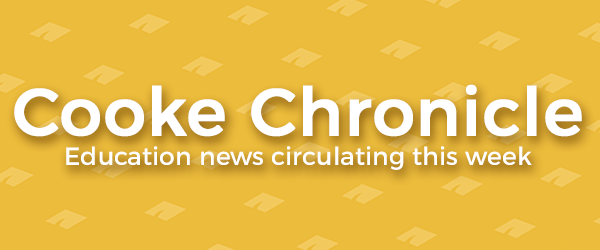Cooke Chronicle: Feb. 3, 2017

Feb. 3, 2017 – Here’s our weekly roundup of education news you may have missed. K-12 programs focus on identifying talented students from underserved backgrounds. State leaders and higher ed advocates look for ways to make college more affordable.
Receive the Cooke Chronicle each week in your inbox. Subscribe here.
Elementary & Secondary Education:
-
A video from CBS News highlights the work of 826 National, a nonprofit organization that offers uniquely engaging tutoring, writing, and publishing for students ages 6-18. In 2016, the Cooke Foundation provided a $20,000 Good Neighbor Grant to 826DC, the organization’s chapter in Washington, D.C.
-
In an interview with WYPR, Johns Hopkins Center for Talent Youth describes the Baltimore Emerging Scholars Program and its effort to identify gifted students from low-income neighborhoods. Increasing diversity has also been a concern for many gifted programs in public schools. KUOW investigates the racial and socioeconomic disparities in Seattle.
-
Education Week summarizes 10 recommendations for improving equity in K-12 education, as outlined in a new report from the Council of Chief State School Officers and the Aspen Institute Education & Society Program.
Higher Education:
-
“The reason America still has such a large ‘opportunity gap’ is because students from different economic backgrounds attend different colleges,” explains Preston Cooper in a Forbes commentary.
-
Tennessee Governor Bill Haslam announces a plan to extend the state’s tuition-free community college program to all adult residents, reports The Tennessean. In related news, the University of Hawaiʻi is organizing a pilot program to provide free community college to students with financial need.
-
“The cost of room and board has doubled between 1980 and 2014 at public and private four-year colleges, when adjusted for inflation, and is up by more than 40 percent at community colleges,” states The Hechinger Report. “While increases during that time in tuition and fees have been at least partly covered by rises in financial aid, the rising cost of room and board has not”.
Cooke Foundation Highlights:
-
In conjunction with this weekend’s Super Bowl festivities, The Washington Post Magazine‘s cover story focuses on John Kent Cooke and the work of the Jack Kent Cooke Foundation. The piece describes how our founder’s legacy has supported scholarships for roughly 2,200 extraordinary students who have substantial financial need.
-
Beyond free tuition, college affordability proposals must also address the rising costs of attendance. In The Huffington Post, Executive Director Harold O. Levy explains how increasing the maximum Pell Grant amount would help low-income students afford textbooks, fees, and room and board.
-
Talented students from low-income, single parent households should receive more encouragement to apply to selective schools, says Dr. Marika Lindholm in an opinion for The Hill. The piece cites findings from our “True Merit” report, noting that students “have the right to know that though elite schools are hard to get into, if they’re accepted, money probably won’t be an issue.”
-
Together with the National Partnership for Educational Access (NPEA), we are accepting nominations for the 2017 NPEA/Cooke Foundation Award for Excellence in Educational Access. The award will recognize NPEA member organization, program, or school with a $5,000 monetary award for excellence in supporting underrepresented students to and through college.
Social Media Spotlight: